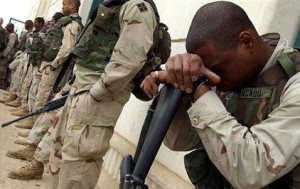
There’s an interesting discussion taking place on Corey Robin’s blog regarding Ezra Klein’s apology for supporting the Iraq War:
Like many people who supported the Iraq War, Ezra Klein has written his apologia.
But he fails to identify—indeed, repeats—his biggest mistake in supporting the war: When thinking of the US government, he thinks “we.”
Iraq, [Kenneth Pollack] said, shouldn’t be America’s top priority. We should first focus on destroying al-Qaeda. We should then work on the Israeli- Palestinian conflict. Only then should we turn to Hussein. Moreover, when and if we did invade Iraq, we should do so only as part of a coordinated, multilateral operation…
…
After all, what other chance would we get to topple Hussein?
…
It wasn’t worth doing precisely because the odds were high that we couldn’t do it “right.”
Klein doesn’t think a state invaded another state; he thinks “we” went to war. He identifies with the state. Whether he’s supporting or dissenting from a policy, he sees himself as part of it. He sees himself on the jeeps with the troops. That’s why his calls for skepticism, for not taking things on authority, ring so hollow. In the end, he’s on the team. Or the jeep.
I’ve learned a lot from reading the comments. (Now there’s a sentence you rarely see on the Internet these days.) One commenter, Justin, replied:
Maybe I’m too naive, but isn’t the problem that more people DON’T identify with the government? If we identify with the government, then its failings are our failings and there’s more motivation to change things because they’re being done in our names. If we don’t identify with it, then it’s just this abstract entity that we can have nothing to do with, which leads to the government abusing its power because none of us feel responsible for it.
I guess I don’t think it’s a problem that Klein is “on the team” – it’s that most of us aren’t on it and thus don’t have any say on what’s happening.
Another commenter, Ned Ludd, raised a different point:
Because he supported the stablishment position on Iraq, Ezra Klein was able to rise into the ranks of the establishment. Back in January 2007, Jebediah Reed of the now-defunct Radar Magazine took a look at some of the career trajectories of pundits who supported the war (Tom Friedman, Peter Beinart, Fareed Zakaria, Jeffrey Goldberg) and the subsequent careers of vocal opponents of the invasion (Robert Scheer, William. S. Lind, Jonathan Schell, Scott Ritter). If Klein had been against the war, he never would have been promoted from obscurity to the pages of the Washington Post.
All of these points raise the question of how such a calamity as Iraq can be avoided in the future. As The Atlantic‘s Elspeth Reeve has ably demonstrated, the 10-year anniversary edition of self-flagellation for supporting the Iraq War has blossomed so ubiquitously as to necessitate a taxonomy of apology bullet points: “I was but a lowly worm,” “I was fooled by bad intelligence,” and so on.
However, what many such Iraq War apologists and (much later) apologizers seem to have in common is an inability to grasp their deeper failing for directing much of their vitriol at the anti-war crowd and castigating those people (who turned out to be very right in the end) as a bunch of hippies. Freddie deBoer remembers this specifically:
You know, I’m reading all of the Iraq mea culpas, some good, some bad. But they are all systematically ignoring one of the most obvious and salient aspects of the run up to the war: the incredible power of personal resentment against antiwar people, or what antiwar people were perceived to be. As someone who was involved in day-to-day antiwar activism at the time, the visceral hatred of those opposing the war, and particularly the activists, was impossible to miss. It wasn’t opposition. It wasn’t disagreement. It was pure, irrational hatred, frequently devolving into accusations of antiwar activists being effectively part of the enemy. Yet for as visible and important as this distaste was for the debate, it’s missing from the postmortems.
Ta-Nehisi Coates has similar memories:
I am not a radical. But more than anything the Iraq War taught me the folly of mocking radicalism. It seemed, back then, that every “sensible” and “serious” person you knew — left or right — was for the war. And they were all wrong. Never forget that they were all wrong. And never forget that the radicals with their drum circles and their wild hair were right.
And Conor Friedersdorf compiles a roundup of mockery aimed at anti-war protesters before and during the war.
It’s enough to make one wonder if we ever learn anything, at all, from history.






